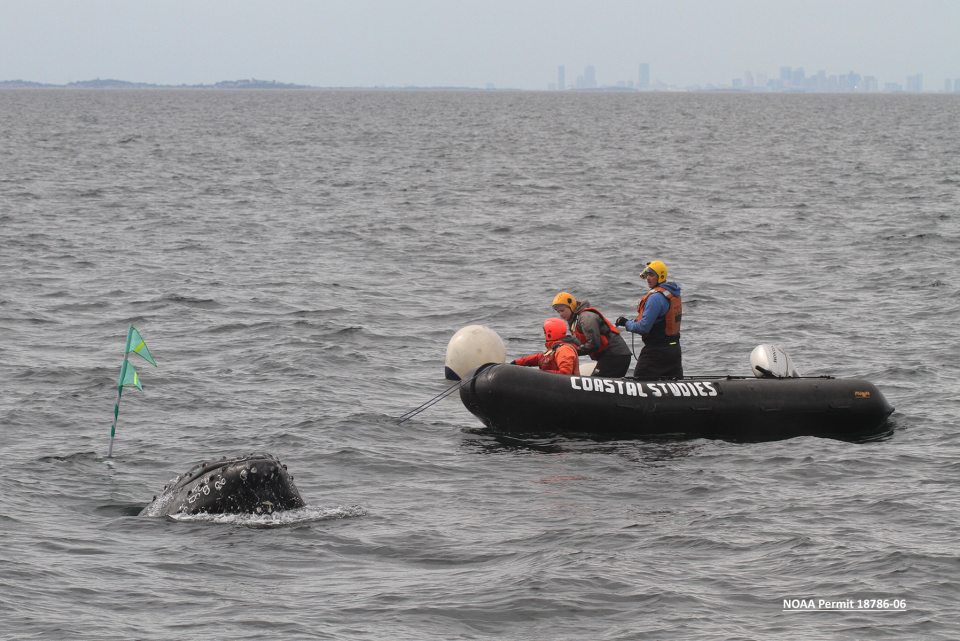Young humpback whale freed of entanglement by Provincetown team
North Atlantic right whales are not the only marine animals that may find themselves in a man-made bind as they feed in the waters of Massachusetts and Cape Cod bays. And scientists aren't the only ones taking notice.
On Sunday, a young humpback whale was spotted outside Boston Harbor tangled up in fishing gear. The ones who spotted the whale and called for help, were recreational fishermen out on the water that morning just east of Hull.
A whale and species on the brink: The end may be near for chronically entangled Snow Cone
The unidentified fishermen reported the entangled whale to the U.S. Coast Guard, which in turn called on the Marine Animal Entanglement Response (MAER) team at the Center for Coastal Studies in Provincetown.

Help was quickly on the way, but the young whale, approximately 30 feet in length, wasn't terribly interested in sticking around.
Whale led rescuers on a hunt
Still strong and able to swim, the frightened humpback gave the fishermen and Coast Guard the slip, diving into the depths and disappearing, along with what was described by the Center for Coastal Studies as "hundreds of feet of rope."
Determined to help the whale, the three-member rescue team, riding in a small, motorized, black inflatable boat began a search and enlisted the help of other boaters who were in the area. The elusive whale, who was also dragging a buoy with aqua, yellow-striped flags, was found again with the help of a recreational vessel, about four miles to the southeast.
Taking it slow for whales: NOAA eyes more restrictions to protect right whales, but it could be costly for Provincetown , ferries
The rescuers noted that the whale appeared to have gotten a mouth full of buoy line while feeding, as the rope was caught in its mouth, and wrapped around its head and tail. The animal continued to try eluding its human helpers — a common response, according to Scott Landry, director of the response team.
"Despite its entanglement, the whale was highly mobile and able to dive and swim well enough to evade the MAER team," according to the Center for Coastal Studies.
In the effort to disentangle the reluctant young cetacean, the rescue team employed a grappling hook and large floats that served both to keep track of the whale's position when it was trying to flee by diving, and to slow the animal down so help could be given. Finally, a knife attached to a 30-foot pole was used to make a strategic cut in the ropes. Shortly afterwards the entanglement fell off and "the whale sped away," according to the center's account released late Monday.
"Many thanks goes to the mariners for their help in this case, and to the US Coast Guard and the National Marine Fisheries Service," the center said.
Other entanglements this season
Over the summer, there were three young humpback whales putting on a show off Plymouth, drawing spectators to the shore and the water. At one point, one of the whales slammed down on the bow of a boat as it was lunging while feeding, leading authorities to put out warnings for boats to be sure to maintain some distance. It is not known if it was one of these rambunctious youngsters that rescuers helped free from gear on Sunday.
There have been other entanglement rescues involving humpbacks this season.
REPORTED IN MAY: Humpback whale disentangled but not out of the woods yet
One was on May 30. A humpback female named Thumper, who was caring for a calf at the time, was cut loose from a serious entanglement about 10 miles east of Chatham. Then, on June 14, a humpback calf was freed of an entanglement in the waters east of Chatham — a particularly precarious rescue because its mother was nearby and rescuers could not predict how she might react.
Humpbacks get caught in moorings, buoy lines
Like other whales that spend the summer months in Massachusetts and Cape Cod Bays, and points further north into the Gulf of St. Lawrence, humpback whales can become entangled in different types of man-made gear, from moorings to buoy lines for traps and pots, and gillnets.
Whale tags go missing: Keep your eyes peeled on Cape Cod beaches and at sea
"Once entangled, if they are able to move the gear, the whale may drag and swim with attached gear for long distances, ultimately resulting in fatigue, compromised feeding ability, or severe injury, which may lead to reduced reproductive success or even death," according to NOAA Fisheries.
The agency notes on its website that "there is evidence to suggest that most humpback whales experience entanglement over the course of their lives but are often able to shed the gear on their own."
The number of whales that become entangled and do not survive is not known.
Humpbacks can generally be found in Massachusetts and Cape Cod bays from mid-April through October, when they migrate to the West Indies to spend the winter.
Heather McCarron may be reached by email at hmccarron@capecodonline.com.
Gain access to premium Cape Cod Times content by subscribing.
This article originally appeared on Cape Cod Times: Young humpback cut loose from fishing gear by Provincetown team

